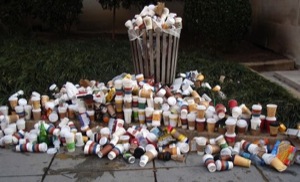There are 2.85 million people in the twin cities, 5.3 million in all of Minnesota, and over 300 million in the U.S. Each of these folks consumes probably, on average, 2 purchased beverages a day. Simple math tells us that we are throwing out 6 million (twin cities), 10 million (MN), and 600 million (US) containers a day. The website sustainability is sexy quotes information stating that Americans use 16-23 billion coffee cups per year. Just coffee cups!
 This is not a staged photo.
This is not a staged photo.
I will never be a preacher. I just don't think it works if you are looking to attract those who don't already believe what you do. Plus, it can be annoying when someone tells you what to do or believe. We are a prideful animal and often like to figure things out on our own. This is exactly why I have waited so long on this statement. I thought as a society that we would figure it out, but I can wait no longer. If I continue to walk into coffee shops only to see everyone sitting, at a table, with a paper or plastic cup, I will go crazy. So here goes: "Come on people, bring your own cups with you!" Whew, that felt good, thanks.
I don't know how it happened exactly, but 10 years ago, I owned a coffee shop and was standing face to face with the amount of waste produced by the simple act of drinking a beverage...an event that can take some folks less than five minutes. I actually used to buy travel mugs from local thrift stores and give them away to people. Sometimes those mugs reappeared too! I could not help but worry about what would happen if everyone, everywhere used a disposable cup every time they needed something to drink.
The reason this fear even has any credence is due to the fact that it is happening all around us. Convenience and cost overrides what looks like personal responsibility and concerns about waste. As we can see, this problem needs to be seen as two-fold. The responsibility needs to be put on business owners and consumers. If we don't see it this way, it becomes another blame game that never ends.
Consumers need to play their part before much can change. Let me paint a picture that puts all of the power in the hands of the consumer. If you request a mug for coffee or a real glass for water every time you go to an establishment, they might actually have to supply such things. Often the servers are being lazy and don't want to do dishes. At this point though, many businesses simply do not even have any real containers available for the paying customer. So, do you play the helpless consumer, forced to make a choice that creates garbage? It's not your fault, but that does not make you helpless unless you choose to be. Your choice? Bring a cup. Problem solved. Waste reduced.
This is really where we are as a society. Sure we have organic coffee, fairly traded, roasted locally and that is great. But then, why do we stop there and let that delicious coffee land in paper, with a sleeve, plastic lid and possibly a nasty resin liner in the cup (that's what keeps the liquid in). Really, why? Because we can't carry a cup with us? I can't really buy that. In a country where we have endless ambition, work 40+ hours a week and have an endless number of machines to do our work for us, we can't bring a cup with us as we go about the world? Seems a little backwards.
I think what it really comes down to is either not caring or not being able to slow down our minds enough to remember to grab a mug. I have been carrying cups with me everywhere, everyday for years. When I think about the many bags of garbage I have saved it motivates me to try and encourage others...but how?

I'm convinced that people care, but maybe just need a reminder...and a challenge. The challenge is to rise above your habits and daily life for just a second and make this happen. Stop allowing the unnecessary waste produced by to-go products and the enormous amount of energy used in producing them. Think you can do it? Of course. Think about all of the crazy, dangerous and challenging things we do in our lives and then you will realize how easy this is. Plus, it feels good. Below, I am going to lay out some easy ways to reduce waste, tips to make it easier and good reasons why that may not have crossed your mind. Before we get there though, if you want to skip the rest of this, just go out and buy a mug...one you really like.
8 Tips to reduce lots of waste.
1. Bring your own cup. The hardest part, may be getting in the habit of grabbing one before you head out the door. My method to get started involved a sort of "blanket campaign". In other words, I planted cups just about everywhere, making it impossible not to have one handy. I started with one in my work bag or briefcase and one in my car. Those two things are almost always with me. Then, just to be sure, I put one near the front door, where I would be reminded when walking out. Not into this? Use post-it notes. Now, I am so in the habit of bringing a cup with me when I leave the house that my brain automatically asks me if I have: wallet, keys, phone, cup.
Benefits: most places offer a discount for a cup. Also, many places default on the small price since they don't know exactly the size of your vessel. For me, though, the best benefit is the fact that I know what I am getting. I don't have to worry about flimsy cups or lids that fall off. Nothing like getting in the car and spilling hot coffee from a cheap cup on your lap. Time is another benefit. Everything can move a bit faster without a paper cup. Less to buy, less to stock, less to put together (cup, sleeve, cap, etc.). Plus, there are many times when the line at a business exists basically to give you a cup. Have your own...well, off you go.
2. Bring your own bags. Most people do this to some degree. Bringing bags has gotten much more press for some reason. But to what level do you make this happen. Everywhere you go, someone is trying to give you a bag and the only way to avoid it, is to be prepared and aware. First, bring your own. Second, pay attention and say no to bags. You have to say no and sometimes you actually have to give the bag back...and yes, you will get funny looks. Want to step it up? While shopping for produce and in the bulk department of grocery stores, bring your own jars, plastic/glass containers and bags. Again, you will need to think ahead. If you have a shopping list, always put jars/bags on the list. Eventually, it will become part of your routine.
The benefits: Cloth bags can hold a lot of weight and won't break. As for those bulk goods, I much prefer to have my grains, beans, etc. in wide mouth canning jars. They are cleaner and easier to use when it comes time to pour out a cup of rice, for example. Plus, they won't tear open like flimsy plastic bags. Another huge benefit for me is that my pantry and cupboards are much cleaner and more orderly if they are stocked with jars or containers of goods, instead of bags. They are also bug proof.
3. To-go food containers. This is also quite easy. Avoid those to-go containers...most of which are still plastic or styrofoam. While most restaurants will not put to-go food into your own container due to health code concerns, there are still a multitude of ways to reduce waste. One simply requires that you pay attention. Say no to the extras: bags, napkins, flatware, etc. Second, think before you order to avoid over-ordering. We all know how much we can eat and if you order small plates or share, there are no leftovers to contend with. If there are, you can easily place them in your own container or consider leaving them. Is it better to waste a little food or produce garbage so that you can bring that food home (where it most likely will sit uneaten in the fridge until you throw it away).
Benefits: It is always quicker to do something yourself than to have to wait until your server brings you a container or boxes it up for you. As with coffee cups, your container will most likely be sturdier and more spill-proof.
4. Ask your local businesses to have real products to use. Some places will even let you leave your coffee mug behind the bar.
5. Consider packaging as one of the factors when purchasing goods. We know to read labels and look at cost. Have you ever passed on a product because it has too much packaging? I once bought some taco shells that were in a plastic tray, that was in a plastic bag, that was in a box. Never again.
6. Make plastic the last resort. In my opinion, plastic should be the last resort. Much of it is not recyclable, it's production usually involves petroleum and it will last forever.
7. Slow down. Notice how everything talked about above requires some level of thoughtfulness. Slow down and make sure that you are an active participant in this challenge. You may find yourself in a lot more conversations if you decide to take this challenge...especially if your togo mugs are handmade and attractive. In the end, you may find that reducing your waste is saving you time. Every time you use something disposable, you spend time disposing of that product. It adds up.
8. Find a friend. It may sound silly, but when you tell someone else about your personal challenge and goals, they might just help keep you accountable. It is a lot harder to be lazy when someone else is involved. I know that my wife is a big help. If one of us forgets our cups, bags, etc, the other is usually on top of it.
Take the challenge to change your consumption habits and take back real goods. Let us know how you have made a change to reduce your waste and impact on the Earth. Every little bit matters.
If every person brought a reusable cup to Starbucks for just one day, then we could save 1,181,600 tons of wood, 2,040,061,237 pounds of carbon dioxide and 4,441,093,624 gallons of water. from the urban conversion.
For more, these folks have been working hard on this. sustainabilityissexy.com

Lawrence Black is a writer and editor at Simple, Good and Tasty. He can be reached at lawrence@simplegoodandtasty.com.
crazy overflowing garbage can photo credit: Brittany Hardin.




